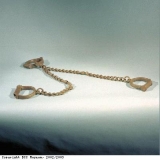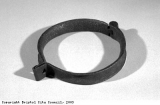A personal account of enslavement
This is an extract from a book called Thoughts and Sentiments on the Evil and Wicked Traffic of the Slavery and Commerce of the Human Species by Ottobah Cuguano, published 1787. Cuguano was born in the 1750s in what is now Ghana, in West Africa. He came from a high-ranking family. His father was a companion to the local chief, and Cuguano was brought up with the children of the chief. He then went to stay with an uncle who lived some way from Cuguano’s home town. Cuguano and his cousins often went into the woods to play and hunt. One day, they were taken prisoner by a gang of men, who accused them of a crime against the local chief. They were marched off and enslaved. Cuguano was then in his teens. He was taken to the coast, and sold through one of the European trading forts (these were built and used by the Europeans as trading bases). Cuguano was taken by ship across the Atlantic Ocean and sold to a plantation-owner on the island of Grenada, in the Caribbean. He was then sold to a man who moved from Grenada to England, and Cuguano came with him as his personal servant. By 1788 he was a free man, and working as personal servant to Richard Cosway, who was the court painter to the Prince of Wales.
Cuguano writes that the men were chained from when they were captured until they arrived in the Caribbean. The men slaves were considered most likely to fight against their enslavement, and so they were often kept chained and under close watch to prevent any revolts. Pictured here are the sort of chains that would have been used. This extract from Ottobah Cuguano’s story begins with his arrival at the trading fort:
‘After I was ordered out, the horrors I soon saw and felt, cannot be well described; I saw many of my miserable countrymen chained two and two, some hand-cuffed, and some with their hands tied behind. We were conducted along by a guard, and when we arrived at the castle, I asked my guide what I was brought there for, he told me to learn the ways of the browfow, that is the white-faced people. I saw him take a gun, a piece of cloth, and some lead for me, and then he told me that he must now leave me there, and went off. This made me cry bitterly, but I was soon conducted to a prison, for three days, where I heard the groans and cries of many, and saw some of my fellow-captives.
But when a vessel arrived to conduct us away to the ship, it was a most horrible scene; there was nothing to be heard but rattling of chains, smacking of whips, and the groans and cries of our fellow-men. Some would not stir from the ground, when they were lashed and beat in the most horrible manner. I have forgot the name of this infernal fort; but we were taken in the ship that came for us to another that was ready to sail from Cape Coast. When we were put into the ship, we saw several black merchants coming on board, but we were all drove into our holes, and not suffered to speak to any of them. In this situation we continued several days in sight of our native land; but I could find no good person to give any information of my situation to Accasa at Agimaque [his family]. And when we found ourselves at last taken away, death was more preferable than life, and a plan was concerted amongst us, that we might burn and blow up the ship, and to perish all together in the flames; but we were betrayed by one of our own countrywomen, who slept with some of the head men of the ship, for it was common for the dirty filthy sailors to take the African women and lie upon their bodies; but the men were chained and pent up in holes. It was the women and boys which were to burn the ship, with the approbation and groans of the rest; though that was prevented, the discovery was likewise a cruel bloody scene.
But it would be needless to give a description of all the horrible scenes which we saw, and the base treatment which we met with in this dreadful captive situation, as the similar cases of thousands, which suffer by this infernal traffic, are well known. Let it suffice to say, that I was thus lost to my dear indulgent parents and relations, and they to me. All my help was cries and tears, and these could not avail; nor suffered long, till one succeeding woe, and dread, swelled up another. Brought from a state of innocence and freedom, and, in a barbarous and cruel manner, conveyed to a state of horror and slavery: This abandoned situation may be easier conceived than described. From the time that I was kidnapped and conducted to a factory, and from thence in the brutish, base, but fashionable way of traffic, consigned to Grenada, the grievous thoughts which I then felt, still pant in my heart; though my fears and tears have long since subsided. And yet it is still grievous to think that thousands more have suffered in similar and greater distress, under the hands of barbarous robbers, and merciless task-masters; and that many even now are suffering in all the extreme bitterness of grief and woe, that no language can describe. The cries of some, and the sight of their misery, may be seen and heard afar; but the deep sounding groans of thousands, and the great sadness of their misery and woe, under the heavy load of oppressions and calamities inflicted upon them, are such as can only be distinctly known to the ears of Jehovah Sabaoth.’




